|
UP
MIDDLE
DOWN
PDF
DOWNLOAD
CONTENTS
COVER

Editorial
Letter to the Editor
Cover Story
On the Road to Ratification
News Features
Half Widows and Orphans–A Way Forward in Islamic
Jurisprudence
Toward a Genuine Human Rights Movement of the
Victims of Human Rights Violations
The Five-Year Old Munir Case
Rights Cannot Die and Disappear
MIDDLE
Celebrating Human Rights Through Poetry and Music
UP
MIDDLE
DOWN
Voice from Thailand Calling for the Convention Now
The First Asian Conference on Psychosocial Work in
the Search for Enforced Disappeared Persons, in Exhumation Processes and the
Struggle for Justice and Truth
Missing Justice: Impunity and the Long Shadow of
War
On Latin America
Guatemala: First Steps to End Impunity
Human Rights Trials in Argentina
Reflections from the Secretariat
Initial Breakthroughs in India
The Power of Memory: A Reflection
Reclaiming our Dignity,Reasserting our Rights
UP
MIDDLE
DOWN
Press Release
Buried Evidence: Unknown,Unmarked Mass Graves in
Indian-Administered Kashmir, A Preliminary Report
Urgent Appeal
Review
Mrs. B: A Review
Minds Teasers
Crossword Puzzle
CryptoQuote
Literary Corner
Emptiness
AFAD MEMBER- ORGANIZATIONS
UP
MIDDLE
DOWN
|
REFLECTIONS FROM THE
SECRETARIAT
Reclaiming Our Dignity, Reasserting
Our Rights l
8th Global
Annual Learning and Learning Program on Human Rights-Based Development
l 1-10 December 2009 l Zenderen and
Amsterdam, The Netherlands l
by Candy May T. Nabaunag l
The more
people learn about and embrace the holistic vision of human rights and
development, the better. Ton Waarts Chairman of the
Board of Directors, Dignity International1
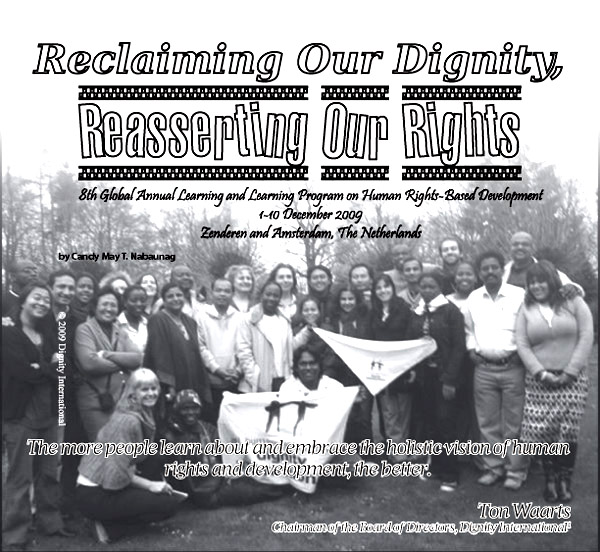
Overview of the Global Learning and Linking Program
on Human Rights-based Development
Human rights and development2
worlds have run parallel to each other—each has its own history,
constituency, strengths, weaknesses, successes, and failures. The more
recent advances, such as the greater recognition of not only legal
justice but also economic and social justice combined with
increased work around economic, social, and cultural rights by the human
rights community on the one hand, and the recognition of poverty as a
human rights issue by the development community on the other, have
brought the two seemingly parallel worlds closer together.3
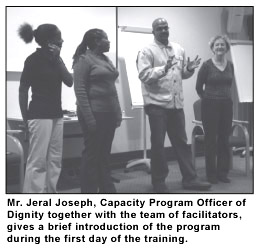
A step in this direction are the Rights Based
Approaches (RBAs) which can be viewed as an attempt to initiate
conversation between the two worlds of human rights and development.
Given the similarities in the longer-term human rights and development
visions to achieve human dignity for all, and in anticipation of future
evolution of human rights and development work, it is possible to
envision these two seemingly parallel worlds coming even closer.4
In early 2002, realizing the hunger for knowledge of
human rights and how human rights relate to poverty eradication, Dignity
partnered with quality and organized institutions to organize a learning
program at a global level on economic, social, and cultural rights.
Then, over the years, it provided more emphasis on the links between
human rights and development, as it particularly tried to meet the
growing demand for capacity building on human rights-based development.
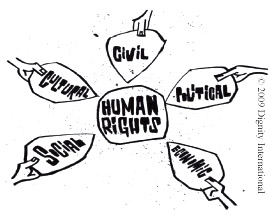 Now
on its eighth year, Dignity has become an instrument to producing
"global change makers." Out of 400 applications from around the world,
twenty two participants representing 19 countries (Armenia, Australia,
Brazil, Burma, Cambodia, Egypt, Ghana, India, Indonesia, Kenya, Malawi,
Nepal, Nigeria, Philippines, South Africa, Spain, Uganda, Ukraine,
United States of America) were accepted by the 8th global program, which
took place on 1-10 December 2009 in the Netherlands (Zenderen and
Amsterdam). All came from various organizations and government offices
that were involved in addressing issues concerning human rights,
poverty, housing, health, discrimination, gender sensitivity, and
education. This author, representing the Asian Federation Against
Involuntary Disappearances (AFAD), was one of the twenty-two
participants of the program. Now
on its eighth year, Dignity has become an instrument to producing
"global change makers." Out of 400 applications from around the world,
twenty two participants representing 19 countries (Armenia, Australia,
Brazil, Burma, Cambodia, Egypt, Ghana, India, Indonesia, Kenya, Malawi,
Nepal, Nigeria, Philippines, South Africa, Spain, Uganda, Ukraine,
United States of America) were accepted by the 8th global program, which
took place on 1-10 December 2009 in the Netherlands (Zenderen and
Amsterdam). All came from various organizations and government offices
that were involved in addressing issues concerning human rights,
poverty, housing, health, discrimination, gender sensitivity, and
education. This author, representing the Asian Federation Against
Involuntary Disappearances (AFAD), was one of the twenty-two
participants of the program.
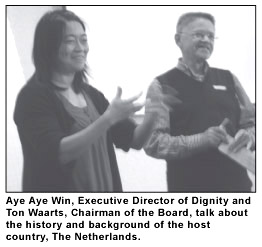 The
10-day intensive training proved to be an enjoyable learning experience.
Delegates were equipped with the knowledge of the key elements of human
rights based development through practical application. It fostered a
sense of commitment among all participants to continue working for the
development of human rights, onwards the vision of human dignity for
all. The
10-day intensive training proved to be an enjoyable learning experience.
Delegates were equipped with the knowledge of the key elements of human
rights based development through practical application. It fostered a
sense of commitment among all participants to continue working for the
development of human rights, onwards the vision of human dignity for
all.
Program Methodology
The program was a learner-centered, creative, and
participatory process. Drawing from the various experiences and
expertise of the participants/learners, the program was also a
multi-cultural exchange, engaging both learners and facilitators to
bring out and understand the human rights basis to development. The
general view is that these two realities (human rights and development)
run in parallel but not together, and therefore, the aim was for the
program to facilitate the participants’ deeper appreciation of the
meaning of human rights and see its integration in development work that
would translate it into concrete strategies and development programming
at the grassroots and regional levels.
Dignity’s training manual was divided into 13
modules:
Module 1
Welcome and Introduction (Part 1 – Ice Breakers, Part 2 – Introductions,
Part 3 – Program Methodology)
Module 2
Understanding Human Rights Module 3 Understanding Development
Module 4
Human Rights-Based Approaches: Links to Human Rights Standards
Module 5
Human Rights-Based Approaches: Links to Human Rights Obligations
Module 6
Human Rights-Based Approaches: Accountability and Redress
Module 7
Human Rights-Based Approaches: Non-discrimination and Attention to
Vulnerable Groups
Module 8
Human Rights-Based Approaches: Participation
Module 9
Human Rights-Based Approaches: Empowerment
Module 10
Globalization, Development and Human Rights
Module 11
Human Rights-Based Strategies
Module 12
Human Rights-Based Programming Cycle
Module 13
Conclusions and Closing
From Poverty to Dignity
Throughout the whole program, the work and interests
of each participant have been used as bases for understanding
development work and the need to link this work with human rights.
Module 3 was designed specifically to understand and uncover these links
and to understand the complexity and multi-dimensional nature of
poverty. This module also gave Participation, Accountability,
Non-discrimination, Empowerment, and Linking to
human rights standards (PANEL) a new meaning and the participants
were able to associate theoretical concepts and the realities on the
ground. PANEL are the key elements of a human rights-based
approach to development that would address the multiple layers of
poverty.
The team of facilitators headed by Dignity’s Capacity
Program Officer, Jerald Joseph, made the program all the more enriching
and engaging. They had made the dialogue and exchange between and among
the participants simple and unique. They were able to extract diverse
answers and solutions based on their knowledge of human rights.
One key feature of the program is a day of field
visit to expose participants to the struggles of people living in
poverty or facing discrimination. This year, the participants were
divided into two teams. One team traveled all the way to Belgium to
visit two organizations—Recht-Op, Antwerpen5
and Antwerp Institute for Community Development6.
The other group was fielded in Utrecht and visited Street News (Straat
Nieuws) Utrecht7 and The
Tussenvoorziening8. It was
another opportunity for the participants to gain experience and be able
to see poverty in Europe—a place where they think it doesn’t exist. Most
of the organizations that were visited hoped to offer people living in
poverty the chance to re-enter society by helping them develop a sense
of responsibility. The participants were impressed by the way the
communities were empowered. They have seen indicators that these people
showed efforts to get out of poverty without asking for charity.
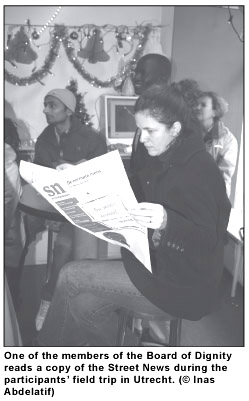 As
final project, the participants were asked to draw up a campaign or
project proposal based on a real case study. They were divided
into 5 groups and each was given different case studies to work on. Each
campaign was presented in a plenary session. All participants had the
chance to act as a member of the Board of Directors who either approved
or denied the proposed campaigns. The activity proved to be interesting
as it reflected how much of the issues and ideas learned during the
course were absorbed by the participants; more importantly, how they
were able to implement the human rights based approaches in their daily
work. As
final project, the participants were asked to draw up a campaign or
project proposal based on a real case study. They were divided
into 5 groups and each was given different case studies to work on. Each
campaign was presented in a plenary session. All participants had the
chance to act as a member of the Board of Directors who either approved
or denied the proposed campaigns. The activity proved to be interesting
as it reflected how much of the issues and ideas learned during the
course were absorbed by the participants; more importantly, how they
were able to implement the human rights based approaches in their daily
work.
The program culminated with activities for the
International Human Rights Day. The participants started their day by
attending an international roundtable on the "Global Financial and
Economic Crisis—A Human Rights Perspective."9
The roundtable was opened by Professor Louk de la Rive Box, the Rector
of International Institute of Social Studies. The speakers included Dr.
Manuel F. Montes, from the United Nations; Prof. Dr. Nico Schrijver,
Member of the UN Committee on Economic, Social, and Cultural Rights; Mr.
Arjan Hamburger, Dutch Human Rights Ambassador; and Ms. Liesbeth van der
Hoogte of Oxfam NOVIB.10
In the three hours of rich inputs and interventions,
the roundtable highlighted the social, environmental, and human rights
impact of the crisis of people living in poverty in Europe as well as in
the global south. Ms. Quinta Ansem of the European Anti Poverty Network
(EAPN) shared the impact of the crisis on the poor in Europe while Ms.
Prossy Jonker of Raising Voices in Uganda focused her intervention on
the impact of the crisis on primary education programs in Uganda. Mr.
Zeyar Lin of Foundation for Education and Development highlighted the
worsening situation of migrant workers with examples from Thailand and
Burma. Mr. Joy Tudu of the Church of North India outlined the human
rights and environmental impact of the crisis on the indigenous
communities and how these communities have become the "structural
victims of internal colonialism."11
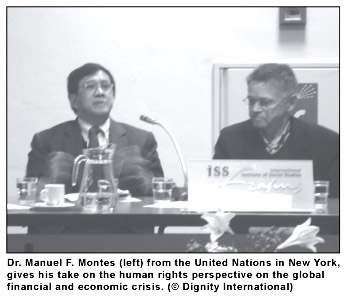 After
the roundtable, the EAPN-Netherlands, Dignity International and the
participants of the program joined many other organizations to convene
at Parliament Square in The Hague to celebrate the International Human
Rights Day. True to the event’s theme, "Reclaim our Human Dignity and
Reassert our Rights," representatives from each continent—Africa, Asia,
Americas, Oceania, and Europe lit the Human Rights Torch that symbolized
justice around the world. Each also shared short solidarity and
inspirational statements clinging to the hope that human rights bring
and anticipating the challenge ahead to make this a reality. The happy
crowd sang and danced to the pulsating music of BrotherHood4Real Band,
which resonated throughout the square.12 After
the roundtable, the EAPN-Netherlands, Dignity International and the
participants of the program joined many other organizations to convene
at Parliament Square in The Hague to celebrate the International Human
Rights Day. True to the event’s theme, "Reclaim our Human Dignity and
Reassert our Rights," representatives from each continent—Africa, Asia,
Americas, Oceania, and Europe lit the Human Rights Torch that symbolized
justice around the world. Each also shared short solidarity and
inspirational statements clinging to the hope that human rights bring
and anticipating the challenge ahead to make this a reality. The happy
crowd sang and danced to the pulsating music of BrotherHood4Real Band,
which resonated throughout the square.12
The group was welcomed by Mr. Coskun Cöruz of the
Foreign Affairs Committee of the Parliament, who pledged his commitment
to do what he could to ensure that "all human rights become a reality
for all, everywhere." Mr. Cöruz pointed out that the present Dutch
government puts highest priority on human rights in its foreign policy,
not just in actions and diplomacy, but also by directly supporting human
rights organizations and activists in many places of the world.
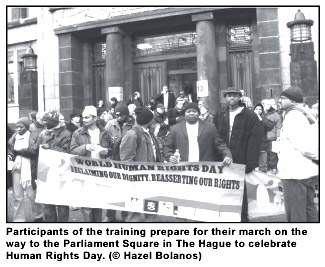 The
Human Rights Day celebration was concluded with a social evening in
Resto Van Heart13 where
the participants ate and danced with members of the EAPNNetherlands. The
Human Rights Day celebration was concluded with a social evening in
Resto Van Heart13 where
the participants ate and danced with members of the EAPNNetherlands.
Conclusion
My journey in the human rights highway is still too
short and fresh; there are still a lot more for me to see, learn and
discover. Nonetheless, this training gave me an unparalleled experience.
I will always treasure all the new feelings and approaches the
training offered me. Not only did I acquire new ideas and skills in
training and in human rights and development concepts, but I also did
become a different person—more aware of the world, its peoples, and
their intrinsic diversity. For that, I owe immense gratitude to Dignity
International and its outstanding organizing committee, the EAPN, the
AFAD and to all the participants, who are now my newest friends.
Together let us reclaim our dignity and reassert our
rights!
___________________________________
1 Dignity
International was founded in October 1999 largely by communities
directly experiencing poverty and social exclusion who felt that there
is a need for a global human rights movement that will promote and
defend economic, social and cultural rights on par with civil and
political rights – a human rights movement that will defend the human
rights of the poorest and most vulnerable in our societies. Its aim is
to empower the affected communities through human rights awareness and
enrich the contents of human rights with their input; work with and
affect change in the lives of the poorest communities through local,
global campaign action; and advance the human rights framework in the
overall debate on globalization. To know more about Dignity
International, visit their website at.
2 Development has meanings in several contexts and there
is no universally accepted definition. There has largely been an
emphasis on economic development and the human dimension was not always
present. In the program, development is understood as holistic and
multi-disciplinary - encompassing human development, social development
and sustainable development. In short , it is the enduring development
of livelihoods and greater quality of life for human beings.
3 Dignity International, Hakijamii Trust, Nairobi, and
People’s Movement for Human Rights Education. Information document: A
New Global Linking and Learning Program on Human Rights in Development.
Accessed 1 February 2010 from
http://www.pdhre.org/HRD_InfoDocumentFinal. doc.
4 Ibid.
5 One of the associations that have been established in
Flanders that describes itself as an association in which the poor take
the floor. It consists of groups of poor people and poor families that
meet together with volunteers and, in some cases, also with professional
social workers. Together, they organize leisure and cultural as well as
educational activities. They work together to improve their situation,
to better inform the broader public of their situation and to influence
those people who can help them solve their poverty problem (social
workers and policy-makers).
6 Advocacy channels for foreign people living in poverty
in Antwerp and the Flanders.
7 Founded in 1994, its goal is to offer a daily spending
activity to the homeless. The daily paper is edited in cooperation with
the poor people. Its vision is to offer chances to re-enter this society
by helping them to create a working experience by selling the
newspapers.
8 Initiated in 1993, it is an innovative not-for-profit
organization in Utrecht (The Netherlands). It provides shelter, support
and assistance to homeless, roofless people and other marginalized
groups.
9 For more information on the roundtable, visit
http://www. dignityinternational.org/dg/RC/Dignitydocs/2009/roundtable_flyer.
jpg.
10 Dignity International news
http://www.dignityinternational.org/dgi/news.php
11 Ibid.
12 Ibid.
13 An independent organization who invested in social
cohesion
of the Dutch society. The goal of the restaurant is to help people to
get out of social exclusion and to enhance the level of social cohesion
within the neighborhoods and their cities.

Candy May T. Nabaunag. Previously working as an academic librarian for
major universities in Baguio City, Candy opted to extend her horizons and
shifted to NGO work. Her knowledge of the library profession is now fully
realized through her stewardship of the AFAD Resource Center.
VOICE March 2010
UP
MIDDLE
DOWN
|